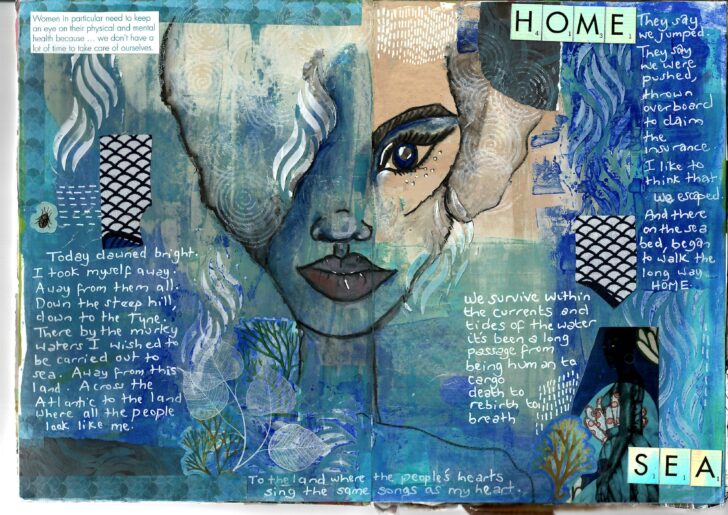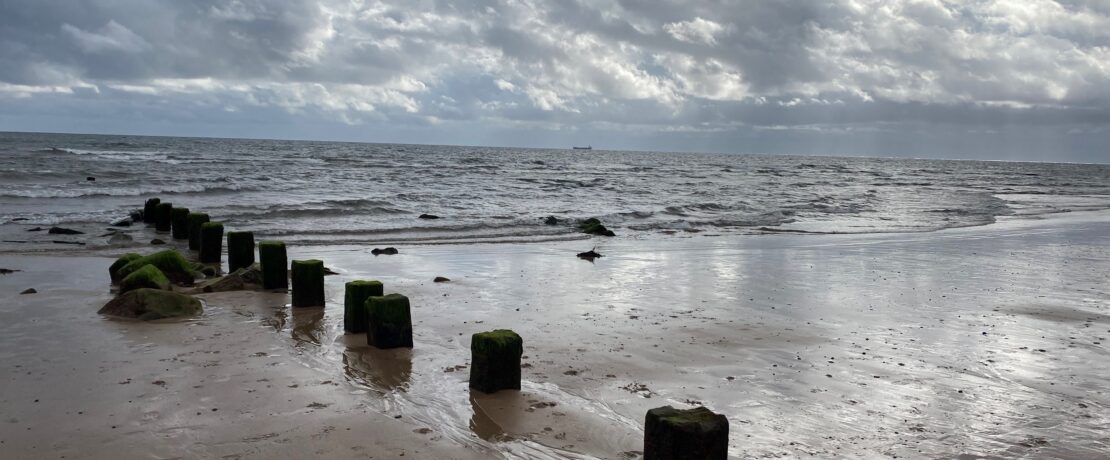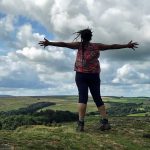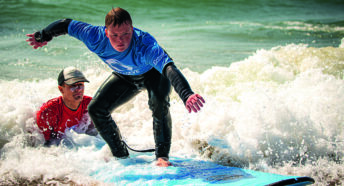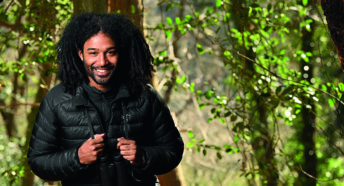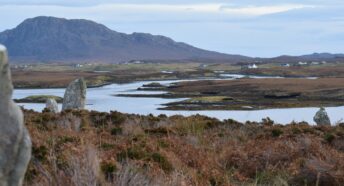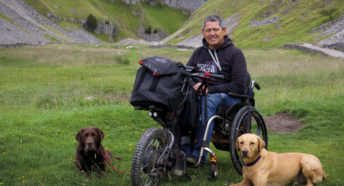A country journal of a Blackwoman: ‘whose blood runs with the tides’
Writer, artist, teacher and creative Sheree Mack, on cultivating a sense of belonging through displacement, her deep-rooted connection with nature, and returning to the sea.
As a Black child, I’m chasing the waters
It’s the wildscape of the ocean that calls me. The ocean is where my family comes from; from the Caribbean and West Africa. Walking out of the water to be here, England.
The wildscape of my people is vast and deep and unknown. Once they arrived here, they never ventured back into the sea. They stayed far, far away, disconnected, confined within urban spaces, squirrelling away what work and money they could, to build a life as second-class citizens. Yet I, a generation or two removed, cannot venture far from the sea. It’s as if within this mythical and traumatic watery world my ancestors’ bones and souls exist. Alive and calling to me. When my family was forced to leave their homelands, through choice or not, we all became displaced. When Charles, George, Thomas and those whose names we’ll never know, departed the Motherlands, we were separated from the landscapes of home. Through my body’s core, through time and space, I’ve been remapping my way back.
Nature has healing properties
For those of you who like statistics, who prefer ‘facts’ instead of life experiences, research has found that, “only 1% of visitors to UK national parks are from Black, Asian or ethnic minority backgrounds.” Black people are nearly four times as likely as white people to have no access to outdoor space at home. In this survey, 37% of Black people had no outdoor space, compared to 10% of white people. Even the 2020-21, participant-led research project exploring inequalities in access to the countryside for people of colour commissioned by CPRE states that there are many hurdles and barriers preventing access. Not just finances, but also information, transport, racism and the lack of visibility of diversity in the British countryside.
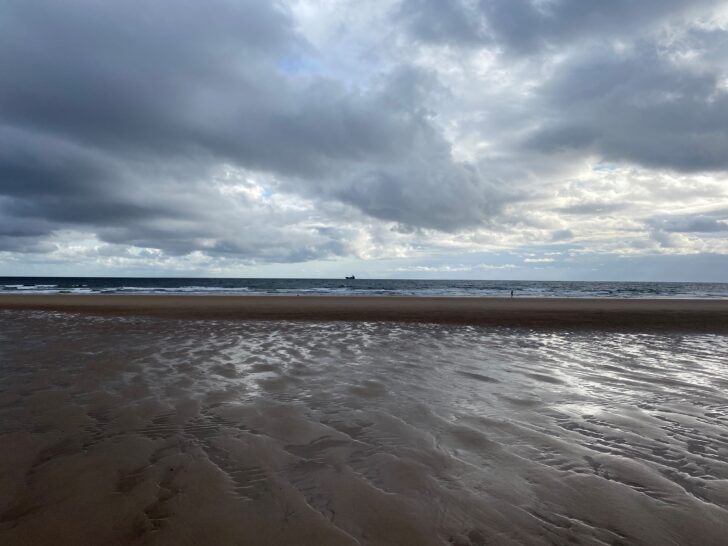
I ask the question, how far does research go in changing attitudes, in changing the perception and reception of People of the Global Majority in the landscape? How far can initiatives and programmes instigated by mainstream environmental organisations, which are predominately white, bring about change from fears of venturing out into the unknown into those feelings of belonging as don’t we already belong?
She takes to the earth
Growing up in inner-city Bradford, I lived and breathed within the shadows of the Yorkshire moors and dales. But I didn’t know this until I returned to the area as an adult. I had the finances, the car and the wherewithal to journey through the landscape which wasn’t feasible during my childhood as we lived in poverty. The script I ran in my head was the almost stereotypical story of being a kid of immigrants, growing up in an urban setting, always looking towards the bright lights, streets flowing with milk and honey of opportunities kind of narrative. But I feel now that this just isn’t true. Once my dad died and we moved back to my mum’s home semi-rural village running along the River Tyne, I had a connection with nature even if I wasn’t conscious of it at the time. I’d walk between villages, past sheep, horses and cows. Wander into the dene full of ancient oaks and beech trees, squirrels and foxes. I felt like an oddity because I didn’t see anyone who looked like me doing this walking stuff, not recognising my sister or mum walking beside me.
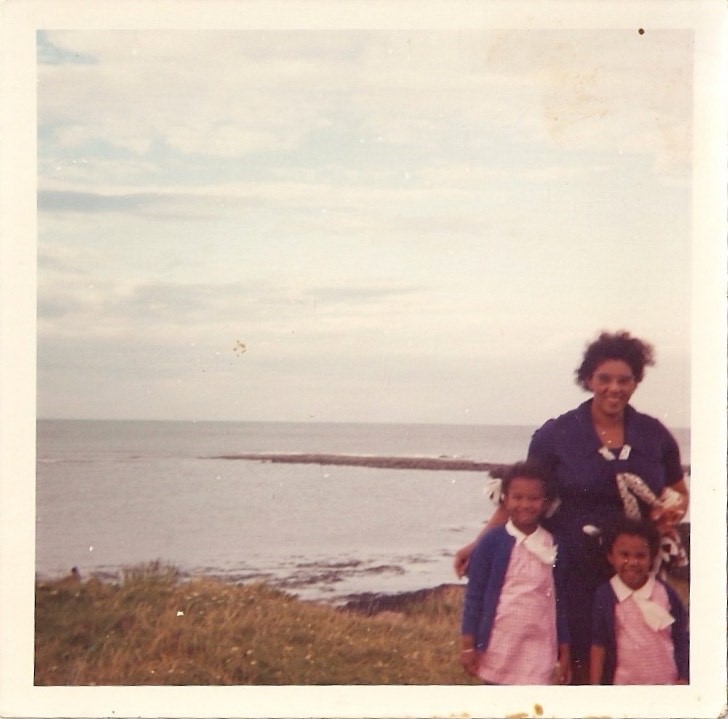
Dress billowing about her knees she paddles
During the summer holidays, the whole village buses to the sea. Mum can’t swim but she paddles. Bunions, callouses, varicose veins, arthritis. So many ailments made easier to bear after time spent at the seaside. Come to the shoreline, sensing within the body, the edges of my being, my histories, my matrilineage within the Northumberland landscape. Conjuring the palimpsest as I place my feet into the sea. A haunting through landscapes and time, but also we as human beings; living, breathing palimpsests. Mum didn’t have to speak for me to understand that we experience our day-to-day happenings, storing memories as well as our ancestors’ memories in our bodies. Stored in our bodies and psyches are the trans-generational traumas, metaphorical palimpsests; the body remembers.
I have learned to mother myself like blossom
I can see the picture so clearly in my mind. Sepia-toned, greys and distressed creams. She is young – my mum. Laying back on both hands, in the grass with bushes behind. A white blouse and dark full skirt. Smiling comfortably in her natural element. Blooming. Mum in the meadow. I keep coming back to this image, the beginning of it all. Maybe it’s because this is one of the few photographs of her outside. Peeling back the layers each time I see it. The image is an example of how we can use the few artefacts we have to construct narratives about ourselves and our kin. Narratives where we centre ourselves rather than relying on the “official stories” we’ve been force-fed around Black bodies and where they have a right to go and be.
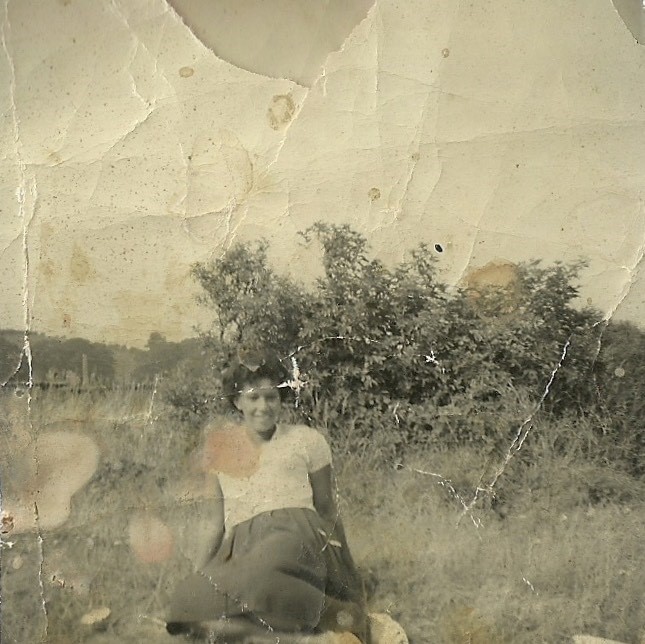
Ocean Mother: giving birth to all the waters
I am drawn to the waters. It may be that I am searching for something. Looking for home? Searching for self? Or maybe it’s just I’m susceptible to change as the sea is never the same sea twice. ‘Seas’ is a more correct term, as the tides and the weather change the physical shape of the sea, bringing different treasures to marvel at. The sea is never the same sea twice. I know now that to heal is to remember, to return to, and to reclaim.
My first home was my mum. Her womb. Her waters. I return to the water. Water carries memories. For the displaced and separated maybe water and the earth is the closest thing we have to kin and home. That’s why when I’m lost I return to nature as she never judges me but holds me. And I too along with bell hooks believe that, ‘when we love the earth, we are able to love ourselves more fully.’ . I fell in love with nature just being with her. Closer to her. As a consequence, in return, I fell in love with myself. We are one. Nature and me. Me and Nature. Nature made me feel safe inside my body probably for the first time in my life. Who wouldn’t want to return to this feeling again and again as often as possible?
